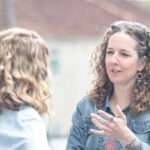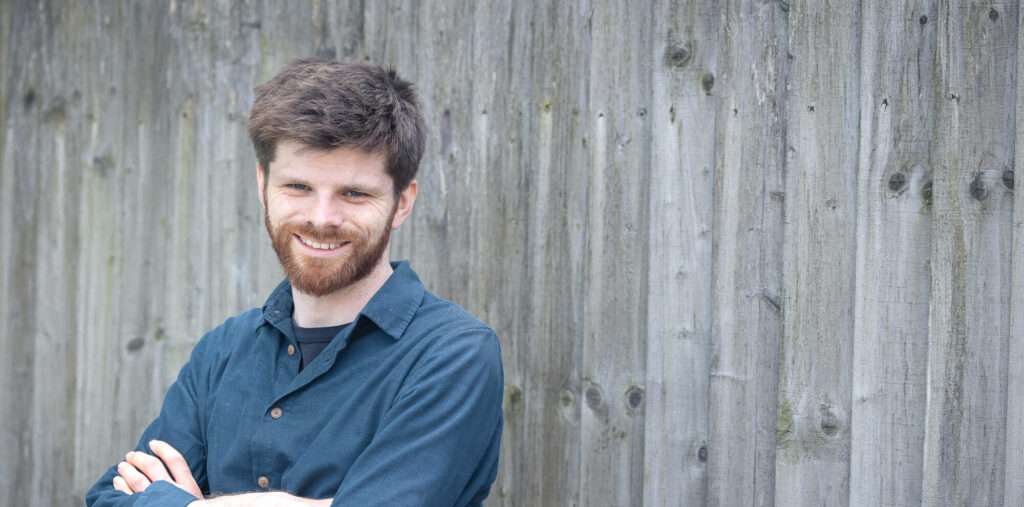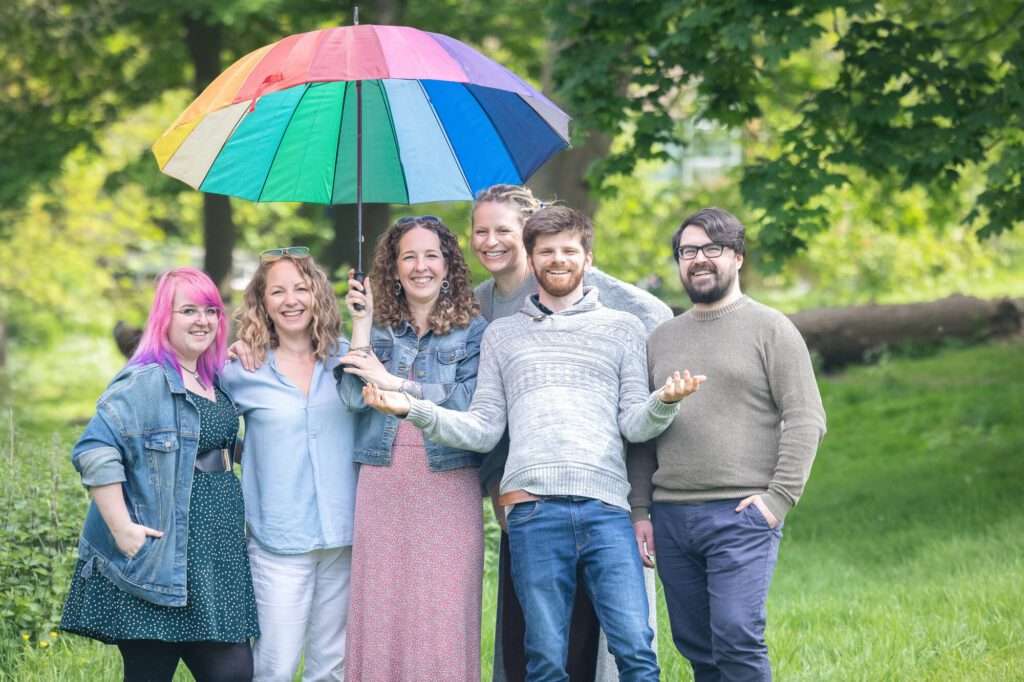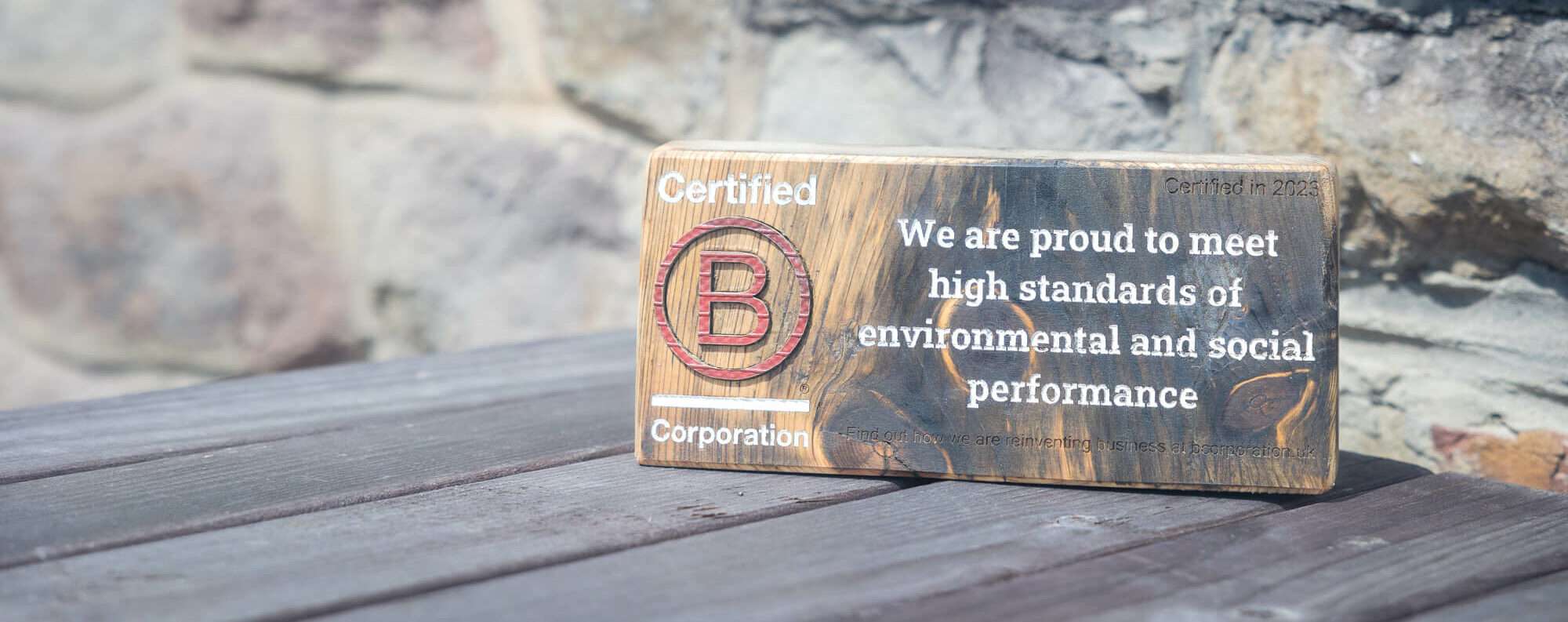
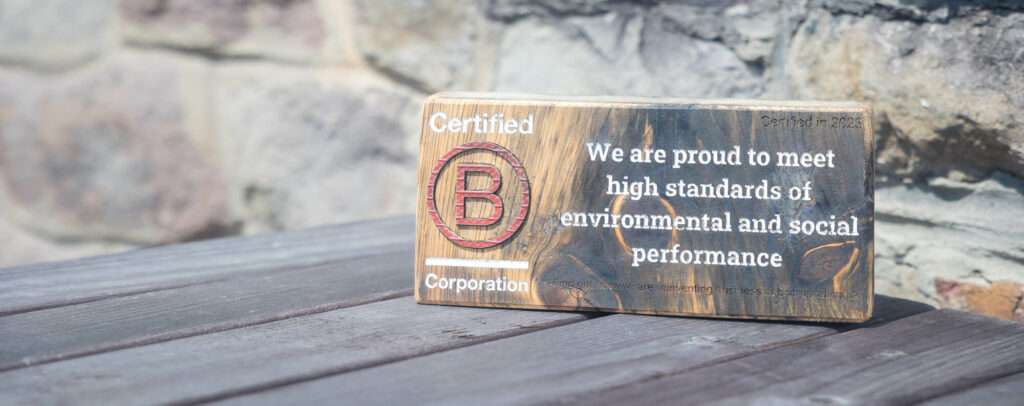
How to become a B Corp: everything we learned as a small business
B Corp certification is on the rise. There are now 2,000 B Corps in the UK, and over 8,700 in the world – and in March 2023, we were proud to become one of them.
We believe in business as unusual and we are on a mission to not only uphold B Corp’s high standards of social and environmental performance, transparency and accountability ourselves, but encourage others to do the same.
If you want to know how to become a B Corp, here’s a deep dive into everything we’ve learned along the way.
TL:DR
- Why become a B Corp?
- What does becoming a B Corp involve?
– The B Impact Assessment
– Gathering evidence
– Submission and membership fees
– How long does certification take? - Tip 01: Get buy-in from your team
- Tip 02: Find a system and stick to it
- Tip 03: Use tech to make tracking and reporting easier
- Tip 04: There’s no need to go it alone
- Tip 05: Remember, becoming a B Corp is not a one-off process
- More information and how to get started
Why become a B Corp?
There’s no getting around the fact that B Corp certification does take a lot of time and effort – as it should do. So before you start out on the process, it’s good to remind yourself about why you want to do it.
Naturally one key reason will be validating the efforts you’re already making as a values-led business. The process will also give you a framework for increasing those efforts and having an even greater impact on people and the planet.
“The benchmarking aspect was a real driver for me,” says RH&Co founder Rin. “I wanted to know what good looks like, so we can aim for that in all we do as a business. Understanding where we’ve got gaps, where we’re not doing as well as we could, is the best way to challenge ourselves to be better this year than we were last year.”
And there are harder business benefits too. According to the latest stats, between 2017 and 2020 B Corps saw average turnover growth of 26% compared to the national average of 5%, and between 2018 and 2021 B Corps saw an average employee headcount growth of 14% compared to the national average of 1%. All useful to know if you need to get buy-in from any of your more commercially focused colleagues.
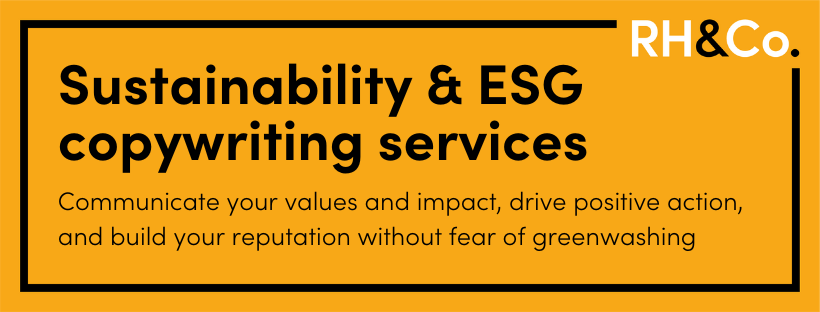
What does becoming a B Corp involve?
Now let’s look at the process. In a nutshell, there are three main steps:
- Complete the B Impact Assessment to get your initial score
- Create and collate the evidence needed to back up your assertions
- Go through the review process and receive your final score
As part of the assessment and evidence process, you’ll need to change your company’s articles of association in order to build your commitment to people and planet into your legal structure, protecting it now and in the future.
The B Impact Assessment
The assessment is made up of around 200 questions that cover 12 months of operations across five key impact areas: governance, environment, customers, community and workforce. You’ll be asked everything from how you track customer satisfaction to what the ratio is between the highest and lowest salaries in your organisation.
You’ll need to get over 80 points to certify and you’ll need to recertify every three years, during which time the standards are likely to go up – so you can’t just rest on your laurels.
Gathering evidence
This is where the real work comes in. In general, you’ll find yourself needing to do three things:
- Documenting what’s already happening e.g. we’ve always supported charities in various ways but now we have a policy that sets out formal schemes including volunteer days and match funding for any money team members raise.
- Measuring what’s already happening e.g. we’ve always tried to use local suppliers where we can but now we are tracking the proportion of our purchases that are made through local suppliers and have a target for increasing that number.
- Implementing new ideas that aren’t yet happening e.g. we started a cycle to work scheme because going through the assessment made us look at the options currently available to the team in terms of travelling to work.
Submission and membership fees
You’ll need to pay a £250 fee when you submit your application to show that you’re committed to the verification process. Then once you’ve certified, you’ll need to pay an annual membership fee, which is weighted depending on your revenue, starting at £1,000 for business turning over less than £150,000 per year and going up to £50,000 for those turning over £750m to £1bn.
How long does certification take?
Realistically, you should expect the entire process to take up to a year. We started in March 2022. It took us three months to complete the B Impact Assessment and gather enough evidence to feel confident that we would reach the required score.
We were then in a queue for our review for 9 months, during which time we continued to work on evidence gathering. Around 4-6 weeks before our interview, our verification analyst began asking for additional pieces of evidence, and then the interview itself took around half an hour. We heard back on our final score within a few days.
Tip 01: Get buy-in from your team
While you’ll need one person or team to take ownership of the project, B Corp certification is a whole-business effort. Everyone has a part to play, whether that be your IT or procurement lead choosing to buy reconditioned tech from a local supplier, or the finance department processing supplier invoices in good time, or HR ensuring that their recruitment policy encourages diversity.
There’s no point having a cycle to work scheme in place if no one uses it, or having recycling bins if everyone prints more documents than they actually need to. Remember, being a B Corp is about more than window dressing. Your values have to be lived not just written down on the About page of your website. If you haven’t got a B Corp culture, you’re really going to struggle to get the certification, and rightly so.
“I had no idea what B Corp was all about before we started our application process but going through the certification process really opened up my eyes to how important it is,” says RH&Co Sales & Marketing Assistant Ingrid Morgan.
“In a world where so many companies are doing business the wrong way – treating employees unfairly, damaging the environment, putting profit above anything else – I’m proud to be working for an organisation that is taking a stand and doing things the right way.”
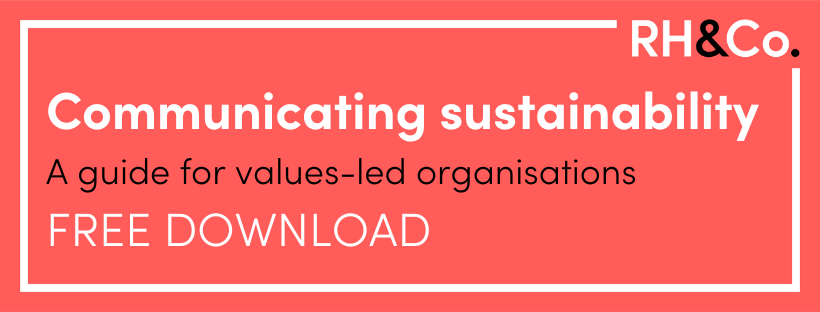
Tip 02: Find a system and stick to it
B Corp certification is largely an evidence-based process. You can’t just answer the questions, you have to back those answers up. And remember, there are 200 of them. That’s 200 process documents, evidence logs, survey summaries and more.
As a result, it’s important to create a system that works for you so that you can track what’s been done, what still needs to be done, who is doing what, where relevant files are and so on.
“You do need to be organised,” says Liz Leaman, RH&Co’s Operations Director and our lead on the B Corp project. “Make sure you break things down into bite sized chunks. Set yourself a section to do every week and just keep plugging away at it, bit by bit. It might take you months but that’s ok.”
Tip 03: Use tech to make tracking and reporting easier
B Corp certification involves gathering and monitoring a lot of data. For some tasks, a good old spreadsheet might be enough but there is plenty of tech out there designed to make it easier to monitor your sustainability journey.
For example, we’ve been using Giki Zero to track our personal carbon footprints. Each of us has a Giki profile where we’ve answered a series of questions about our habits ranging from the type of transport we use to the type of food we eat. This initial setup gives us our individual carbon footprint. From there we can try out ‘steps’ – categorised by type and impact size – to improve our score, whether that be something as simple as using the eco setting on the washing machine or as complex as installing solar panels.
RH&Co copywriter James Matthews says: “I was pretty nervous about tracking my carbon footprint at first, since I don’t have the option to make a major change like replacing my boiler or installing a heat pump. But Giki is great at giving practical suggestions everyone can take, like unsubscribing from junk mailing lists. Once you start taking small actions and seeing your score change, you start wondering if there are bigger steps you can take after all.”
Tip 04: There’s no need to go it alone
If there’s one thing B Corp does well, it’s community. So why not get into the habit of working together during the certification process? You’ll find most B Corps are very willing to answer questions and share advice, and there are also specially trained B Leaders who have been equipped with the tools and knowledge needed to support businesses on their B Corp journey.
We worked with Andy Hawkins of Business On Purpose, who runs small group cohorts on a regular basis. Getting involved in these sessions not only helped us to understand the assessment process and gave us a chance to ask questions when we weren’t clear, it also allowed us to share that journey with others in a similar circumstance and learn from their experiences.
“I really enjoyed our sessions with Andy and the rest of the businesses who were going for their B Corp certification,” says RH&Co’s Project Administrator, Kassi Marshall, who supported Liz on our B Corp project. “It kept us motivated and accountable, and it was good to feel like we were part of something bigger.”
Tip 05: Remember, becoming a B Corp is not a one-off process
If you’re thinking that B Corp certification is a quick win marketing exercise, think again. Sure, earning the right to put the B Corp logo next to yours will most likely win you points in the eyes of a values-driven audience – but if that’s the main goal then you’re unlikely to get far.
B Corp certification tests your mettle in a way that goes well beyond the surface. You can’t just appear to be doing good, you actually have to prove it. As an example, we’ve always recycled in the office. But that wasn’t enough. First, we had to submit a photo of our recycling bins to prove we’re doing what we say. And we now also track how much rubbish goes into each bin – landfill vs recycling – and have targets to reduce the landfill amount.
Rin says, “For us certification was just the first step. The real goal of being a B Corp is to keep making progress, as well as encouraging others to do the same.”
More information and how to get started
B Corp has a huge number of resources available to help you through every step of your certification process but we’ve found that sometimes so much information can be overwhelming! There are also a number of microsites, which adds to the confusion.
So here are some of the key pages you’ll need to get started:
If you still feel that B Corp certification is for you and your business, we wish you the very best on your journey. It’s an awesome community and an enormously worthwhile step in your sustainability journey. If you’ve got any questions about our experience of the process, please don’t hesitate to get in touch.
Back to hompeage
